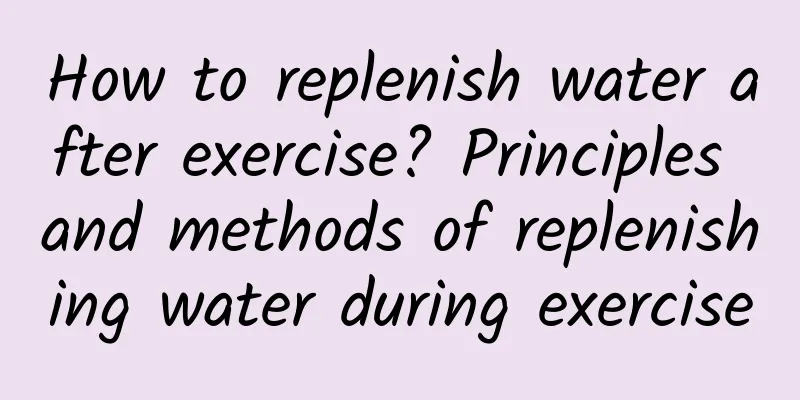How to replenish water after exercise? Principles and methods of replenishing water during exercise

|
Exercise is the best way to maintain health. With the continuous improvement of people's living standards, more and more people like to exercise, especially men. If you are tired from work every day, you can use exercise as a way to keep fit and relieve stress. So, how to replenish water before and after exercise, what methods should be used and what principles should be followed? Don't drink too much before exercise Under normal circumstances, the human body excretes about 1500 ml of urine a day, plus the water from feces, breathing or evaporation from the skin, a total of about 2500 ml of water is consumed, and the human body can only replenish about 1000 ml of water from food and metabolism every day. Therefore, a normal person needs to drink at least 1500 ml of water every day, about 8 cups, to maintain our normal body metabolism. But if you do strenuous exercise, you need to take in more water to prevent dehydration. This is not only to prevent the body from becoming dehydrated due to excessive lack of water, but also to ensure that your body is always in the best state for exercise. You should take in 2 to 3 cups (500 to 700 ml) of water within 2 to 3 hours before exercise to ensure that your body is not dehydrated before exercise. If you are always hydrated, you don't need to take in too much water, because the body cannot store too much water. But if it is summer, the weather is hot and the consumption is high, so the frequency of water replenishment should be appropriately increased. Sports drinks are the best for hydration During exercise, the water metabolism rate accelerates and a large amount of water is lost. Therefore, water should be replenished every 15 to 20 minutes, and 0.5 to 1 cup (120 to 230 ml) of water should be drunk each time. However, when the exercise time is too long, more than 60 minutes, or when the exercise is high-resistance exercise, sports drinks are needed. Because intense exercise will cause the electrolyte metabolism process in the body to accelerate, and a large amount of electrolytes will be lost with sweat. Therefore, water, sugar and electrolytes should be replenished together. If you do not pay attention to fluid replenishment during exercise, it may lead to sports dehydration. Sports drinks generally contain sugar and electrolytes, and the components and contents of various nutrients can adapt to the physiological characteristics and special nutritional needs of athletes. Many athletes drink sports drinks between games. In addition, the amount of fluid replenishment during exercise should generally not exceed 800 ml, and must be taken in small amounts and multiple times to avoid excessive burden on the gastrointestinal and cardiovascular systems caused by a large amount of fluid replenishment at one time. When performing high-intensity exercise in high temperatures, the amount of fluid replenishment per hour should be greater than 300 ml. It should be noted that sports drinks are not suitable for everyone. People with high blood sugar or diabetes should be particularly cautious when drinking. In addition, people with high blood pressure, poor heart function or kidney function should not drink a lot to avoid increasing the burden on the heart and kidneys. In addition, it is generally not recommended to drink sports drinks containing carbon dioxide gas before and during exercise, which will cause bloating in the stomach and is not conducive to exercise. Drink water according to your heartbeat after exercise After exercise, the body is still in the excitement stage and the heart rate has not returned to normal immediately. Therefore, try to keep the drinking speed as slow as possible, keep the rhythm as consistent as possible with the heart rate, and drink intermittently in multiple times. This will allow the heart to absorb water in an orderly and sufficient manner. Do not drink too cold water before, during, or after exercise to avoid excessive stimulation of the intestines. The water temperature can be between 37℃ and 39℃. How much water you drink after exercise is related to your body weight. In principle, for every 0.5 kg of weight loss, you should increase your water intake by 2 to 3 cups, about 500 to 700 ml. |
<<: There is a science to drinking tea at the right time. Is it good to drink tea at night?
>>: Just get used to it? What should I do if my husband snores?
Recommend
Morning erections reveal a man's health
When the sun rises in the morning, the man's ...
Is male genital itching caused by glansitis?
There are many reasons why men experience genital...
Scientific Methods for Measuring Penis Length
The penis is an important part of the male reprod...
What are the treatments for acute and chronic prostate disease?
Acute and chronic prostatitis are mainly divided ...
How to effectively cure impotence and premature ejaculation
Nowadays, there are more and more male friends su...
Where is the scrotum located?
The scrotum is a surface located behind the male ...
Are there many people suffering from premature ejaculation?
We have found that many people who suffer from pr...
Pictures of small blisters on the foreskin
Small blisters on the foreskin may be genital her...
Still relying on drugs to nourish your kidneys? You’ll lose out if you don’t drink these kidney-tonifying teas!
Men want to nourish their kidneys? Don't worr...
Leek and pork liver can improve eyesight and nourish the liver. It tastes better when cooked this way.
For people who overuse their eyes, if they want t...
Causes of prostatitis symptoms
The common clinical manifestations of prostatitis...
What is the reason for the glans not being hard?
When a man is sexually stimulated, his penis begi...
What is the line between the anus and the scrotum?
Many people have different body structures. For e...
What causes hiccups when sleeping at night?
When you sleep at night, there are some situation...
Four things men should do before going to bed
Core Tip: When men have trouble falling asleep in...









